by Mayumi-H | May 31, 2014 | Persona 4 Fan Fiction, Process
Recently, I had an interesting dialogue with a writer friend on Twitter. He’d looked through my sci-fi/western/drama/romance and mentioned how “graphic” it is. I agreed that it’s probably “the most gleefully graphic I’ve let myself get in a long time.” Our conversation became more about writing side stories, but I kept thinking about why I’ve enjoyed working with this particular story so much these past few months. Part of that reason is that personal allowance to be graphic, an allowance I haven’t given for my more recent original fiction. There’s a lot of sex, because that’s a big part of the main character’s personal journey, but I’ve also loaded it with more action and violence than I’ve done in a while. Following that thought, I came to realize that it’s the villains who have made this story so much rollicking fun, for me.
I’ve read analyses that say the villain is the most important part of the story. I don’t exactly agree with that wording, because not every story will have a “villain.” In more precise – and also more amorphous – terms, I think it’s conflict that drives a story. I’ve talked about this a bit before, but I want to go into some more detail, here.
Every story needs some conflict, whether it’s external or internal. It’s nice to see characters get a breather or spend some happy time together, but a whole book about that would be rather boring. My drama stories tend to lack a villain in the traditional sense because the conflict usually arises from the hero himself. One of the common characterizations in my stories is that each main character is the principal architect of his or her own happiness…or their own misery. The decisions they make determine how they move forward or backward. Of course, I like development, so they usually set themselves – or get themselves set – on the right path, but the journey’s the fun part, anyway. That said, I hadn’t written a real villain in a long time.
Then, I decided to write a western.
I spent a lot of days reading old westerns, especially the serial stories of Elmore Leonard. The villains in those short stories were varied, violent, cunning bastards. And, even if they only made themselves known for a few pages, they had presence. I wanted my sci-fi shoot-em-up western to have that. Because, while the main character’s internal conflict was perhaps the most important part of the story, he would never be able to make that journey of self-discovery without someone pushing him on. Or shooting at him, as the case came to be.
I love writing my heroes. But, I’ve loved writing these villains, too, each one of them, for their own reasons. Red Widow because she’s a smart, sexy grifter, and deadly for that:
She’d saved her head with her hands, and pushed back against the wall to shove him off. One leg flew out behind her, connecting with Hal’s gut. He staggered with an oof! and she spun, another kick catching him in the ear.
Lohengrin, the Swan Knight, is insane. But his insanity is full of such self-righteous zealotry, his every line full of such grandeur, he makes a formidable foe:
Lohengrin swung his flame toward the popping drehlafette, and licking fire met stoic metal as the autocannon’s barrel slid into place. The muzzle spit its first round, and its second, when the Swan Knight gave a sudden strangled gasp.
Reilly is driven by a simple desire for revenge, but it’s changed him to the point of being unrecognizable even to his old sergeant:
Ax froze at the sight: a gleaming, golden horror of a man, almost seven feet tall with pylons for limbs and black enhancement goggles pressed deep into the puckered flesh of his face. In front of his left eye glowed a red targeting reticle, blazing in the dark. His chest was pockmarked with sparking holes and indentations from the drehlafette, but none of them slowed him down.
And Strenk, who’s probably my favorite of the lot, simply because he has no overarching goal or reason for his grittiness. He’s just plain ol’ nasty:
Strenk’s gaze filled his focus, cold and damning. “Open those pretty petals, tulip.” He dropped his free hand to his crotch. “I want to see if I’ll fit.”
All of these villains do horrible things, and I occasionally feel a bit scared at how easily some of their actions and dialogue have come to me. At the same time, though, I believe in art as a catharsis and unhindered outlay of our personalities, both the dark and light parts of it. Art is also a relatively safe way to explore the more dangerous demons within each of us. I don’t think I could ever pick up a flamethrower and point it at someone, but it definitely gets my senses tingling to imagine that and create it on the page. I suppose what this exercise has truly shown me is that my villains have as much to say about me as they do about my hero. Their danger, their brutality, the sheer ugliness they represent have made this story a crazy-fun ride, because for every dark, twisted action they throw at him, my hero grows a little bit stronger, a little bit wiser, a little more…heroic. But then, isn’t that what a villain is supposed to do?
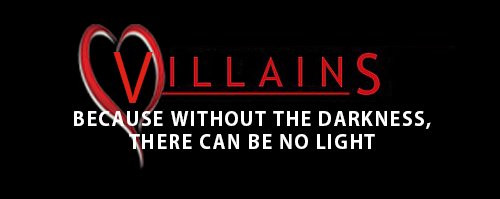
What is it about your villains that you love? (Come on, admit it: there’s a part of you that loves ’em!)
by Mayumi-H | May 24, 2014 | Finding Mister Wright, Persona 4 Fan Fiction, Short Stories
I’ll be honest: religion does not often feature prominently in my stories. I suppose because my own faith is very personal to me, something I don’t always feel comfortable voicing in public. That makes me something of a coward, I guess, but I neither want to invite criticism for my beliefs nor have to engage others in why I believe x or y (but not z). But, as I’ve delved more deeply into the humanity of my characters, I’ve come to realize that they can’t all be just like me. That goes for their ability to be close to the divine as much as it does for their attraction to the darkness.
I’ve always been able to separate myself from my darker characters, the antagonists and villains. Because, while they can be enormous fun to write, I don’t consider myself capable of some of the despicable things they do. Or, I don’t like to consider myself capable. But even my “good” characters have maintained a distance from religion and faith that I think isn’t necessarily indicative of who they can or should be.
Religion is complicated, though. For me, more so than sex, violence, or any other characterization point. Why? Is it because I don’t want to dictate my beliefs to readers? Because I don’t want to be “outed” as being religious in a community where intellect is valued more highly than faith? I don’t want either of those things, to be honest. But I also can’t deny the power of prayer in my own life, so why should I deny it in my stories?
The link below will take you to another “Finding Mister Wright” free-write I did yesterday (~1400 words, 5 pages). I didn’t mean for it to preach anything to anybody. I simply had a notion about the Marshall-that-was that I felt deserved a bit of exploration.
“Namesake” – Another “Finding Mister Wright” free-write
I’ve been putting these in PDF form because I think it should be your choice whether you want to read or not. Not for any sensitive material, but because I know so many of my blogger buddies are on hiatus or simply don’t have the time (or inclination) to read a longish short story that probably doesn’t help them keep to their schedule. 🙂
Do you find your characters represent you, most of the time? Or, do you use them to investigate differences in opinion? Something in between?
by Mayumi-H | May 17, 2014 | From Hell (A Love Story), Process
The knocks burst a staccato beat through the flat, startling on the first and annoying on every one to follow.
Findlay Raske lurched up from the bed, snapping one drooping side of his pyjama bottoms back into proper place above his hip. “All right, all right,” he called. “The hell is this, now?” he muttered to himself, laying one hand on the door for balance. He pressed his face close to the peephole, blinked against the light from the corridor, and groaned.
“For ***** sake,” he said, unlocking and swinging open the door regardless. “Kris, you can’t keep coming round like this! Do you even know what time it is?”
“Three-eighteen,” Kris replied. Not with his typical clipped delivery, though. He actually slurred.
“Christ,” Finn said, wrinkling his nose. “You’re drunk!” He gripped the door handle and started to swing it back. “You know what? Forget it. I’m done picking up your pieces-”
“Hanne’s dead.”
Finn stopped, the door forgotten. The discourteous wake-up call, too. Even the smell of cheap whisky blown on the air between them. Everything except those words…and the red film across Kris’s should-have-been blue eyes.
“Come on,” Finn murmured, settling one hand on Kris’s shoulder and leading him inside. “I’ll make us some coffee.”
Kris nodded and shuffled over the threshold into the flat. He made his way to the kitchen on his own, Finn following at a three-pace distance to gauge.
The years since his unceremonious resignation from the police department – a detective sergeant’s career and pension made worthless because of a few too many unsolicited opinions of proper procedure and conduct – had made Kristoff Stenhall hard-edged and skeptical, but nothing to plunge him into this sort of self-destructive depth.
With a low-blown sigh, Finn stepped around him and moved to the counter and sink. He filled the kettle, pulled out the press, and brought out the coffee tin, all in silence. He scooped one, two spoonfuls into the carafe but froze on the third, for the feel of Kris’s arms around him.
The metal zip of the jacket chilled the small of his back, causing Finn to suck a breath that straightened his spine. He let it go a moment after, though, for the warm, wet blow of Kris’s voice over his neck:
“I need you.”
Finn set the spoon on the counter and turned, pushing an excuse to his lips. But he got only as far as saying Kris’s name when the other man silenced him with a kiss.
The next time Finn spoke, the clock next to the bed read three fifty-seven. He’d had to glance over Kris’s head, resting on his chest, to see it.
“I’m sorry about Hanne.” He stroked his fingers through Kris’s coarse fringe, sweeping it back behind his ear with little success. It drifted loose a second after, falling once more into his eyes. Finn did it again, undiscouraged. That was Stenhall, after all: never anything easy. “I know you were fond of her.”
Kris kept the point of his focus on a space of wall past Finn’s shoulder, blowing a series of slow, steady breaths across his chest. It cooled the fine layer of sweat there, making his nipples harden.
Finn watched him blink a minute before venturing, “Do you know…how…?” He craned his head down for the lack of answer, prompting, “Kris?”
“Murder.”
Finn frowned, not least for Kris’s plain, hard tone. He’d never particularly liked Hanne Rolig – she’d always been able to exert too much influence over Stenhall, even after his resignation – but no one deserved to have their life snuffed out with such callous disregard for their future possibilities. And, despite any conflicts they may have had over their personal choices, Rolig had been a good detective: fair, clever, and concerned with the truth. Finn couldn’t help but admire that.
“I’m sorry,” he said again. “Whatever you need-”
“I need you,” Kris repeated, as the muscles in his arms and back went taut. He pushed himself up from Finn’s chest and looked straight at him. The same redness as before still darkened his eyes, but the blue beneath shone clear and hard as crystal. “I need you to help me find out who did this.”
Many folks say we should write outside our boundaries. If we’re comfortable writing action, try romance. If we always write romance, jump into sci-fi. If sci-fi is our gig, go back in time for some historical biography. As for me, I love reading crime and heist stories, especially adventure-y ones, but I can never pull them off. My mind simply isn’t clever enough to create a mystery or conflict suitable for a detective story.
Above is yesterday’s free-write. I’d hoped to see where a spark for a detective story might take me. As you can see, not very far afield of where my usual interests lie: the human drama. I couldn’t help my brain: I’m drawn more to passionate conflicts and conflicted passions than I am to procedural plot. Still, I like Kris and Finn (and Annie, who wasn’t intro’ed here but who’s been jumping around in my head as I’ve gotten these two gentlemen sorted). I just wish I were smarter, so I could give them a strong story worthy of the affection I already feel for them.
How do you push yourself into new territory?
by Mayumi-H | Dec 14, 2013 | Fearless, From Hell (A Love Story), Process
So, as some folks know, I’m writing this sci-fi western story based on a videogame universe. Blah blah blah, I know, it’s fan fiction and not real writing, whatever. I’m still having a blast with it, and just one of the reasons why is it’s given me a new perspective on some old characters.
For those who read “Anywhere but Here,” my 2012 NaNoWriMo project: Remember Tych and Imien? They were the pilot and the cypher, the secondary runaway characters following the two mains in the teenager half of the story. (Don’t worry if that’s confusing. It’s not important for this post.) Anyway, I came to a point in my current story, “From Hell,” where I needed a getaway ship. At first, I’d planned to model the ship’s captain on the character VT from the seventh session (episode) of the anime Cowboy Bebop, “Heavy Metal Queen.”
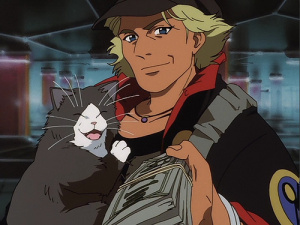
– screen capture: “Cowboy Bebop” –
If you’ve any interest in anime, sci-fi bounty hunter stories, or jazz music, check out Bebop. But, again, not important to this post.
In playing around with the different interaction scenarios between the main characters of “From Hell” and the ship’s captain, I realized the ship couldn’t have just one crew member. So, I developed a daughter for Janus (that was going to be the captain’s name). On the story went, but neither Janus nor the daughter character really took hold with me. The daughter, by the way, never even got far enough in my thought process to get a name. That should tell you something about how well that subplot was going.
One afternoon, I was sitting at my writing desk working on designs for the ship. (That went through a few permutations, too.) I stumbled across an old sketch I’d made of the Ridout, the smuggler’s ship from “Anywhere but Here.” Never one to pass up the opportunity to save the world from my terrible vehicle sketches, I considered my work on the new ship done. And, quite suddenly, it hit me.
I already had a smuggler crew, all ready to go, fleshed out and everything. Enter Tych and Imien…or, as I renamed them, Twitch and Ivory. I’d always liked the Tych and Imien characters, but their personal stories never got any deep attention in “Anywhere but Here,” focused as the story had been on the more major plight of four teenagers on the run from the galactic government. Bringing them into “From Hell” offered me a chance to examine their personalities in a more acute light. Plus, their own conflict, such as it is, relates well to that of the main characters…who are also on the run, now that I think about it, but that’s a thought for another time.
Of course, Tych and Imien had to go through some changes to make the jump from one universe to the other, but I couldn’t believe how stupid I’d been not to consider reusing these characters before! I’d borrowed pieces of other characters to create new ones before – I think every writer does that, at least at a subconscious level. For instance, the second principal character in “From Hell” – Hal, Axton’s engineer partner – developed from a mishmash of Amber from Fearless (cultured and sensitive, but also an elitist snob), and the Brock and Captain Aral characters from “Anywhere but Here” (sharp, loyal, a know-it-all techie, but afraid to pull a trigger). In turn, those characters developed from ones to come before them. I could draw up a whole family tree of where my characters come from…but it would probably be as confusing as the Baratheon/Lannister line of heirs!
I had to bring this up because I’m just having so much darn fun writing this story, and I wanted to share some of my excitement. I’ll go back to more serious stuff next time. Maybe.
Do you recycle characters?
by Mayumi-H | Nov 30, 2013 | From Hell (A Love Story), Uncategorized
(Mostly recycling from Tumblr again, because, after a long week spent helping care for my dad, who’s still going through chemo, I just don’t have the energy to put forth a completely new post.)
In a recent post over at Kourtney Heintz’s Journal, Kourtney brought up the idea of which actor might play which character from her book, Six Train to Wisconsin. While this is different from the idea of who or what may inspire a character, it did make me realize that many of the characters – notably the female ones – from my most recent story were actually based on specific looks and performances.
In “From Hell,” the main character’s appearance has already been determined for the reader, because he’s a borrowed likeness:
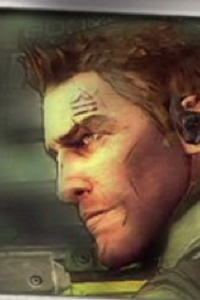
-Axton, the Commando from “Borderlands 2”-
The story may be about Axton, but there’s a slew of women in the supporting cast whom I’ve just adored writing. Among them:
Cin, the charming and sensuous madam who runs the brothel “Cin’s Deadly Seven,” and who was based on gorgeous Adrienne Barbeau’s Ruthie from “Carnivale,” complete with slithering snake tattoos;
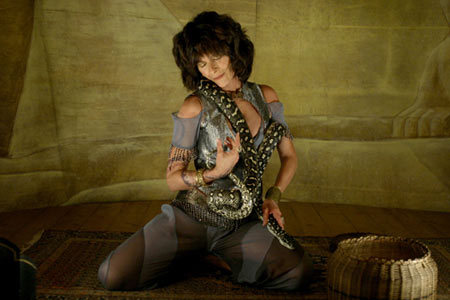
-Carnivale publicity photo-
Red Widow, the cunning, discerning, and dangerous grifter who gives Axton a full-on run for his money in the sexuality and profanity departments (inspired by Gail Potocki’s beautiful and intimidating art below);
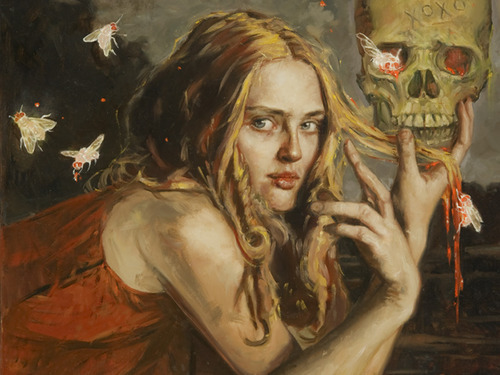
-by Gail Potocki: “Femme Fatale” Cella Gallery show press image-
Marshal Kotonou, who wears a duster and wields a shotgun as well as any man, for protection of her borderworld town (and to whom I’ve attempted to give a nod of attitude and beauty to Gina Torres’s Zoe from “Firefly);
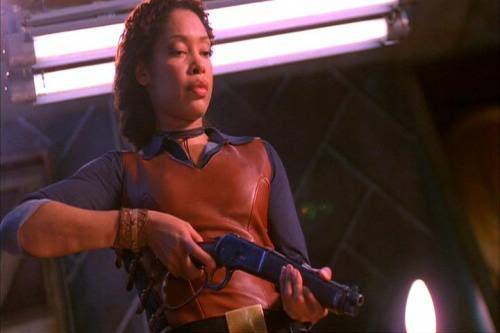
-“Firefly” publicity photo-
Lucy, the practical and sassy prostitute who has better insight into the main character’s head than he does, himself (based on the luscious Patricia Arquette’s portrayal of Sally Wheet in “Boardwalk Empire”);
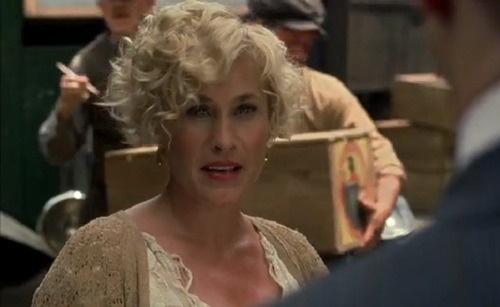
-screen capture: “Boardwalk Empire”-
and Sarah, the main character’s ex-wife from his military days, who provides some telling background about why he is the way he is (inspired by the many roles of lovely singer/actress Ana Brenda Contreras).
Oh! And, of course,
Gaige, the girl who starts the whole story rolling (head on over to
Contagious Media for the full photoshoot)…

-Gaige cosplay by ContagiousMedia-
Stories about men tend to focus on just the men. Especially in the Western genre, where supporting women can fall into pretty predictable (and often hackneyed) categories. The women Axton encounters throughout the story might exist within those same categories, but I hope I’ve added some new dimensions to a few of them. They’re just so much more fun to write, that way. Hopefully, readers are enjoying the women in this story, too. Because, really, what’s a man without a good woman, whether she’s there to screw, fight, or be his conscience?
From where do you get your character inspirations? If you could cast anyone as one of your main characters, who would it be?








![Photo by Valeriatroche (Own work) [CC-BY-SA-3.0 (http://creativecommons.org/licenses/by-sa/3.0)], via Wikimedia Commons](https://24.media.tumblr.com/763f4005039c2534c7d2bb0fe86fa3c5/tumblr_mwjg29ZOyX1qgv9sto1_400.jpg)

Recent Comments